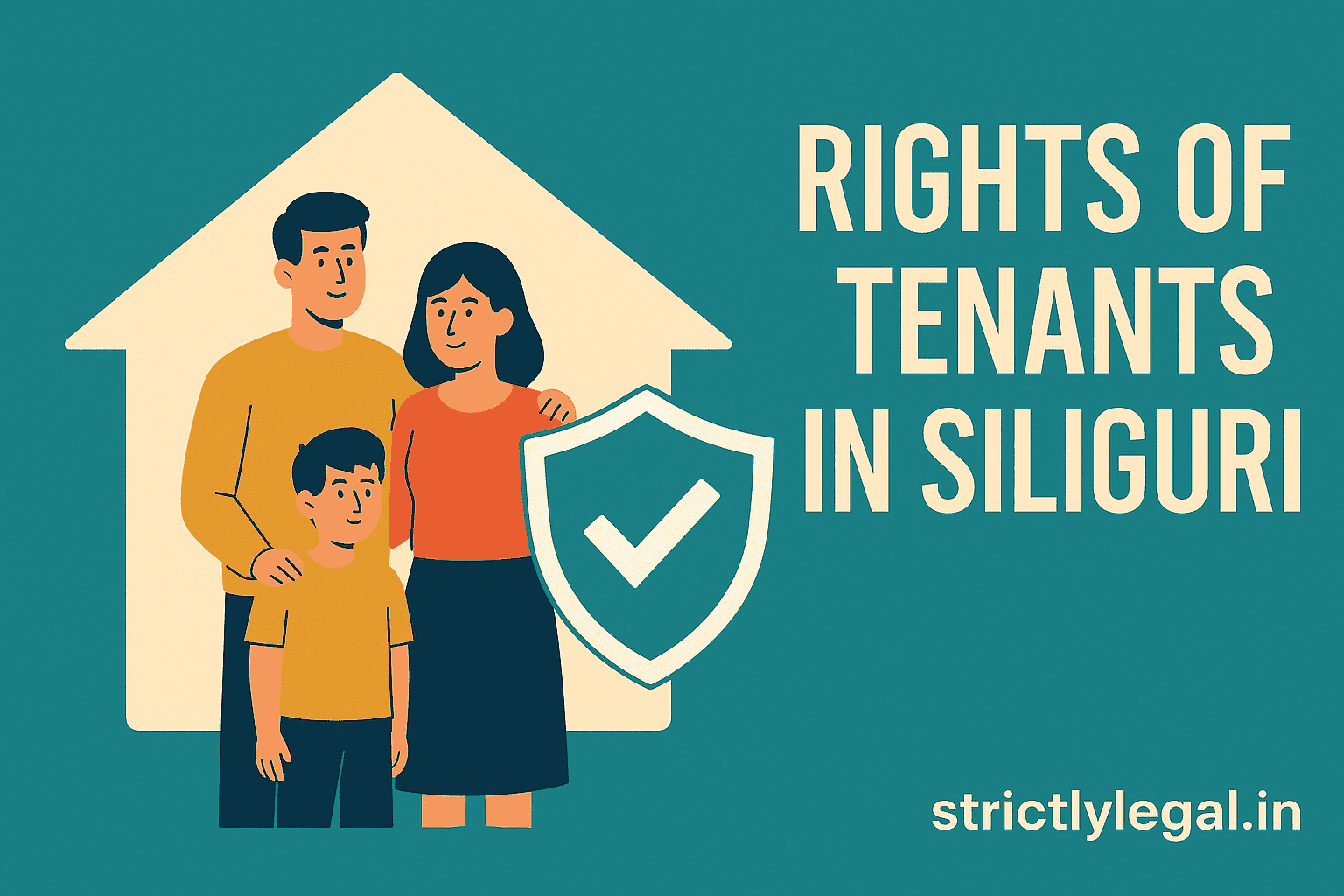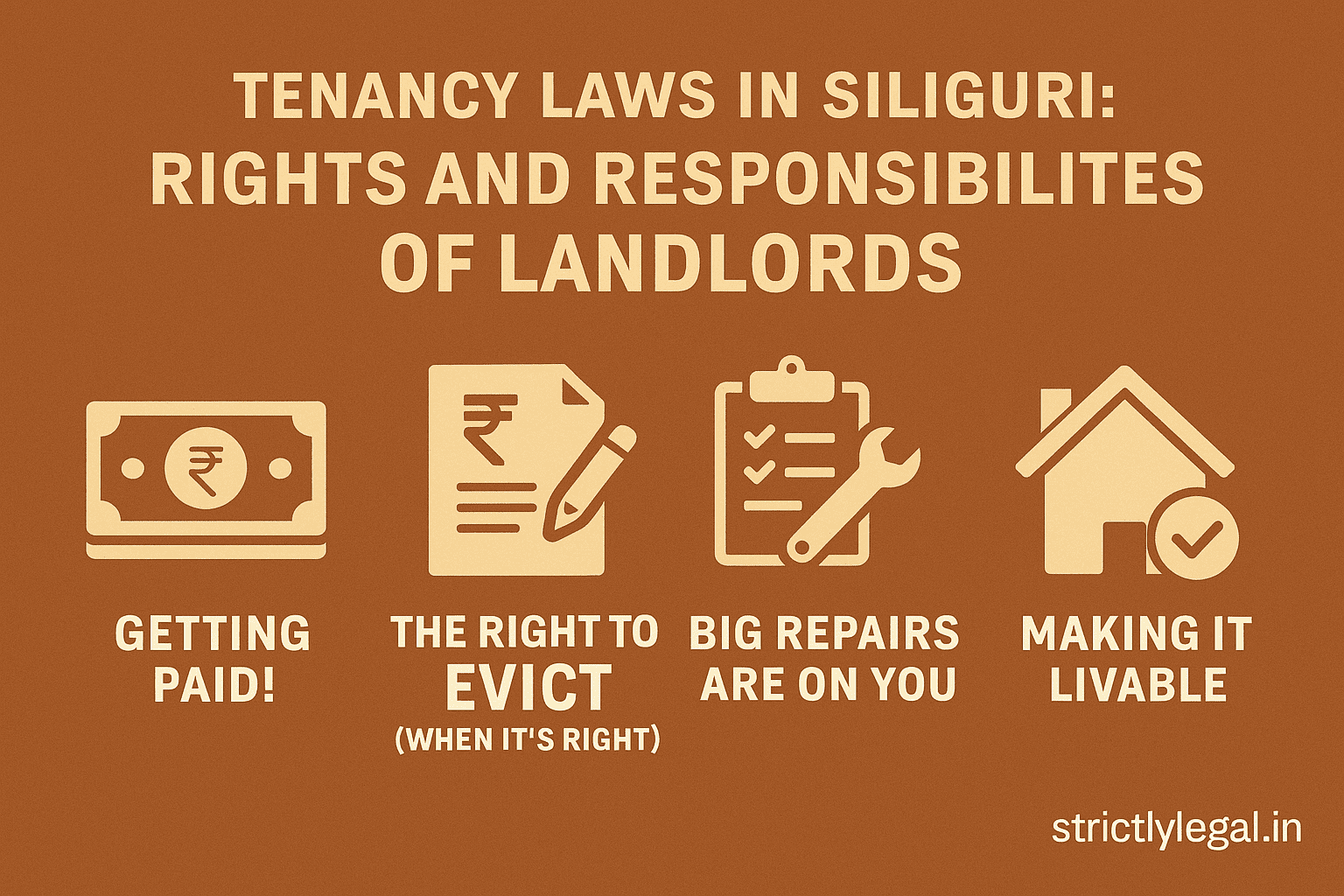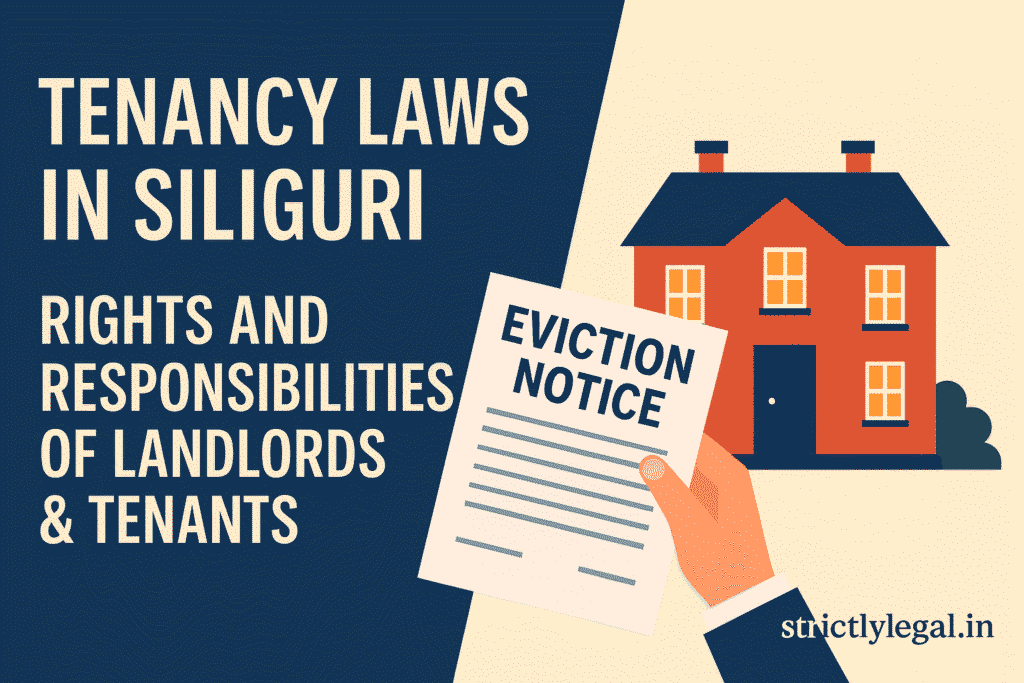Hey there, landlords and tenants in Siliguri! Ever wonder what the deal is with tenancy laws in Siliguri? Understanding these rules isn’t just about avoiding headaches; it’s absolutely crucial for keeping things smooth and peaceful in any rental relationship. From getting a rental agreement lawyer Siliguri to help you draft that all-important document, to knowing what to do if you receive an eviction notice Siliguri, clarity on your rights and responsibilities is simply key. This article is here to break down the essential aspects of tenancy laws in Siliguri (which mostly follow West Bengal’s rules) so you can navigate the local rental scene with confidence. Let’s dive in!
Table of Contents
The Foundation: Your Rental Agreement (and Why a Lawyer Helps!)
Think of the rental agreement as the handshake in writing – it’s the most basic, yet most important, document for any landlord-tenant relationship. Sure, verbal agreements happen, but believe us, a written and notarised agreement is always, always the smarter choice. Why? Because it helps you avoid future misunderstandings and disputes. A rental agreement lawyer from Siliguri can be a real lifesaver here, helping you draft a solid agreement that covers everything important, like:
- How Long’s This For? Is it a fixed period, say 11 months, or more of a month-to-month arrangement? Knowing the duration of tenancy upfront clarifies expectations. While rent agreements cannot be for any longer duration than 11 months due to law limitations otherwise it turns into a lease and a stamp duty is payable on it.
- Rent & Security Deposit: No guessing games here! The agreement clearly states the exact rent amount, when it’s due, and all the nitty-gritty details about your security deposit – how much it is, and under what conditions it’s refunded. Often what we see is that the landlord hold out the deposit even after the tenant vacation. What do you do then? The agreement should clearly stipulate.
- Who Fixes What? Ever argue about a leaky faucet? The agreement should spell out maintenance responsibilities, so you know who’s on the hook for repairs. What if your landlord does the repair and charge you from your security deposit?
- Need to Move? Or want someone to leave? The notice period states how much warning either party needs to give before ending the agreement.
- What Can the Property Be Used For? Are there any rules about usage of property? For example, can you run a small business out of a residential apartment? The agreement clarifies these restrictions.
- Can the Landlord Come In? Your agreement should outline the landlord’s access for repairs or inspections, always with reasonable notice, of course!
Did you know that the West Bengal Premises Tenancy Act, 1997 (which applies right here in Siliguri) has specific rules for these agreements?
Your Side of the Story: Rights and Responsibilities of Tenants in Siliguri
Being a tenant in Siliguri comes with some clear protections. These rights are there to make sure you’re treated fairly:

- The Right to Peaceful Possession: This means your landlord can’t just barge in without warning or harass you. You have a right to enjoy your rented space in peace! You have paid for it, right?
- The Right to Essential Services: Basic stuff like water and electricity? You’re entitled to it! Your landlord can’t just cut these off without following the proper legal steps. Even if you have not paid the rent or there’s a dispute.
- Protection Against Unfair Eviction: Worried about being suddenly asked to leave? Don’t be! A landlord can’t evict you unless there’s a valid legal reason and they give you proper notice. It’s not as simple as just saying “get out!” This is when you need a lawyer; actually much before.
- The Right to Receive a Rent Receipt: This is a simple but important one! Always ask for and keep a receipt when you pay rent. It’s your proof of payment.
Now, with rights come responsibilities, right? As a tenant, you also have duties to uphold:
- Paying on Time: This one’s straightforward: your timely rent payment is expected, as agreed upon.
- Taking Care of the Place: Keep the property in good shape! Normal wear and tear is fine, but you’re responsible for maintaining the property and avoiding damage.
- No Sneaky Subletting! Thinking of letting someone else live there? You generally can’t sublet the property without permission from your landlord, unless your agreement specifically says you can.
- Sticking to the Rules: Pretty simple – you’ve got to follow all the agreement terms you signed up for!
The Other Side: Rights and Responsibilities of Landlords in Siliguri
Landlords, you’ve got rights and responsibilities too, ensuring a fair balance in the rental game:

- Getting Paid! Of course, landlords have the right to receive rent on time, as per the agreement.
- The Right to Evict (When It’s Right): If things go wrong, landlords do have the right to evict (with cause). But this has to be based on specific grounds laid out in the Rent Control Act Siliguri (that’s the West Bengal Premises Tenancy Act). We’re talking non-payment of rent, illegally subletting, using the property for bad stuff, causing major damage, or even if the landlord genuinely needs the property for their own use or to rebuild.
- Checking Things Out: With proper reasonable notice, landlords can inspect the property to make sure everything’s okay.
- Big Repairs are on You: Generally, landlords are on the hook for structural repairs, making sure the building itself is sound.
- Making it Livable: You’re responsible for providing a habitable property, meaning it’s safe and fit for someone to live in.
Navigating Eviction Procedures and the Rent Control Act Siliguri
Let’s be clear about eviction notice Siliguri and the entire process: it’s strictly regulated by law. Landlords simply cannot just tell a tenant to leave on a whim. The West Bengal Premises Tenancy Act specifically outlines the exact grounds for eviction. These include things like:
- When rent hasn’t been paid (default in rent payment).
- When a tenant sublets without consent.
- If the property is being used for illegal purposes.
- When a tenant causes material damage to the property.
- Or if the landlord has a genuine, bona fide requirement for the property, perhaps for personal use or to undertake significant rebuilding.
And what about rent increases? The Rent Control Act Siliguri (again, the West Bengal Premises Tenancy Act) also sets rules for these and helps settle disputes about rent. Any rent hike must follow the legal provisions.
Is Your Rent Under the West Bengal Premises Tenancy Act or the Transfer of Property Act?
Ever wondered which specific law covers your rent? In West Bengal, including Siliguri, your rental agreement and monthly rent primarily fall under the West Bengal Premises Tenancy Act, 1997 if your rental money falls within a certain limit, if it has crossed the threshold, you will be convered under the transfer of propert act.
So, what’s the difference between this and the Transfer of Property Act, 1882? Well, the Transfer of Property Act (TPA) is a much broader, general law that deals with all sorts of property transfers, including leases. It lays down fundamental principles for how property changes hands or is leased out. However, the West Bengal Premises Tenancy Act is a specific state law designed solely for regulating tenancies within West Bengal.
Why does this matter? It’s like this: when there’s a specific law for something (like tenancies in West Bengal) and a general law (like the TPA), the specific law usually takes precedence. The West Bengal Act dives into the nitty-gritty details that the general TPA doesn’t, or handles them differently. This includes things like:
- Rent Control: The state act might have provisions on how much rent can be increased, or even how fair rent is determined. The TPA doesn’t get into this.
- Eviction Grounds: The West Bengal Act clearly spells out limited grounds on which a landlord can evict a tenant, offering more protection than the general TPA.
- Notice Periods: While the TPA mentions notice periods for terminating leases, the state act might have specific, often more protective, rules for residential or commercial tenancies.
So, in essence, the West Bengal Premises Tenancy Act is tailored to protect tenants (and balance landlord rights) in a way the broader Transfer of Property Act isn’t.
When to Call in a Tenancy Legal Advice Siliguri Expert
It’s no secret that disputes between landlords and tenants pop up all the time. Often, they get bigger just because people don’t fully understand the legal stuff. If you ever find yourself in a landlord tenant dispute Siliguri, taking tenancy legal advice Siliguri from a qualified tenant lawyer Siliguri (civil lawyer) is seriously the best move you can make.
A tenant lawyer Siliguri or to put it into better terms, a civil lawyer in siliguri, or any advocate who really knows their stuff about property matters, can be incredibly helpful. They can:
- Help You Understand Your Agreement: Those legal clauses can be tricky! A lawyer will interpret agreements for you, making everything clear.
- Draft Official Letters: Need to send a legal notice, whether it’s an eviction notice Siliguri or something else? They’ll draft notices that are legally sound.
- Help You Talk It Out: Sometimes, a bit of calm discussion helps. Lawyers can facilitate mediation to try and sort things out without going to court.
- Stand Up for You in Court: If things do end up in a legal battle, your lawyer will represent your interests in rent control tribunals or civil courts. You won’t be alone!
- Keep Landlords Compliant: For landlords, a lawyer makes sure all your actions, especially evictions, perfectly comply with the Rent Control Act Siliguri. This stops legal problems before they even start!
So, by knowing your rights and responsibilities and not hesitating to get professional tenancy legal advice Siliguri when you need it, both landlords and tenants in Siliguri can ensure they’re always practicing fair and lawful rental procedures. It’s all about playing by the rules for everyone’s benefit!
Don’t be scared if you’ve recieved an eviction notice from your landlord or if you’ve got a tenant who is a pain. (We’re speaking for both). There are ways you can deal with this of course. You have to approach for legal assistance before it’s too late and water is down the bridge.

Passionate about using the law to make a difference in people’s lives. An Advocate by profession.




